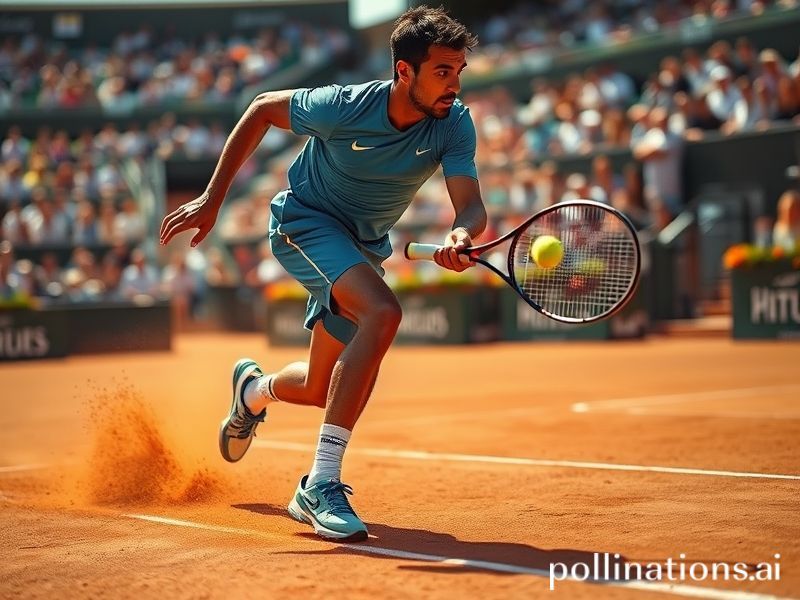Global Spin: How Carlos Alcaraz Became the World’s Favorite Distraction
CARLOS ALCARAZ: THE 20-YEAR-OLD WHO MADE THE WORLD REMEMBER TENNIS STILL EXISTS
By our International Desk—where the coffee’s bitter and the optimism is imported duty-free
Madrid, Riyadh, Melbourne, New York—pick your time zone and you’ll still find Carlos Alcaraz’s backhand ricocheting off every screen like a geopolitical ping-pong ball. In an era when the planet’s attention span rivals that of a fruit fly on amphetamines, the kid from Murcia has somehow convinced us to stare at fuzzy yellow spheres for four hours straight without doom-scrolling. That alone deserves a Nobel in distraction.
Let’s zoom out. While half the globe argues whether AI will steal our jobs or just our girlfriends, Alcaraz has become the rare export Spain can sell that isn’t jamón or political scandal. His victory laps are now international currency: Wimbledon plate sold to Asian markets, US Open reels chopped into TikTok slop for Gen Z, and every Arab sovereign fund suddenly wants to build a clay court in the desert because nothing says diversification like teenage topspin.
The geopolitical angle is delicious. Last month, the Saudi Public Investment Fund floated the idea of a Masters 1000 in Riyadh, dangling appearance fees the size of small defense budgets. Alcaraz, diplomatic as a UN intern who’s read the room, said he’d “consider it if the calendar allows”—translation: Sure, just let me finish convincing Europe I’m the reincarnation of Federer before I cash the Petrodollar check. Meanwhile, China’s CCTV delayed the evening news to broadcast his Shanghai practice sessions, perhaps calculating that nationalist fervor over a Spanish kid is safer than nationalist fervor over Taiwan.
Back in the debt-bloated West, broadcasters treat each Alcaraz final like the last helicopter out of Saigon. ESPN slaps a “Breaking News” banner across the screen, as if the fate of NATO hinges on whether he can outrun Djokovic in a fifth-set tiebreak. Across the Atlantic, the BBC sighs with colonial nostalgia: a swarthy youngster conquering grass courts once ruled by empire—only this time the empire is streaming services and the colonies are subscription tiers.
Economists—those delightful people who failed to predict every crisis since 2008—now insist Alcaraz is a micro-bubble in the sports economy. Ticket prices for his matches have inflated faster than Turkish lira, and sneaker scalpers in Jakarta are flipping his limited-edition Nikes for Bitcoin. One London hedge fund even launched the “Alcaraz Alpha” ETF, tracking everything from Wilson racket sales to Spanish citrus exports (because vitamin C equals endurance, apparently). It returned 22 % last quarter, outperforming the S&P and modest human dignity.
Human-rights watchers, never invited to the fun, note that while Alcaraz smiles for selfies, migrant workers in Qatar are still building stadiums they’ll never afford to enter. The irony is richer than the sheikhs’ horse stables: the same swing that delights millions is powered by shoes stitched somewhere with less stringent labor laws. But hey, nobody tunes into Netflix for supply-chain documentaries—give us the tween forehand and the slow-mo fist pump, please.
Climate activists, not to be outdone, calculated that the carbon footprint of Alcaraz’s 2023 globetrotting equals 3,472 Spanish households. His team responded by planting a token grove of olive trees in Andalusia, which will offset roughly one transatlantic flight if the trees survive the current drought—optimism measured in millimeters of rainfall and Instagram hearts.
And yet, cynicism only gets you so far. In a world busy cannibalizing itself, Alcaraz somehow still serves up the simple, ridiculous joy of watching a human do something absurdly well. For 90 seconds of a passing-shot winner, borders, algorithms, and crypto scams dissolve into the green background of a court older than our collective attention deficit. Then the rally ends, the banner ads reload, and we return to the scheduled programming of existential dread.
But for those 90 seconds—hell, maybe that’s enough. Until the next crisis notification, Carlos Alcaraz remains the planet’s most entertaining reminder that we’re still alive, still capable of awe, and still inexplicably willing to pay $14.99 a month to watch a Spaniard run in circles.







